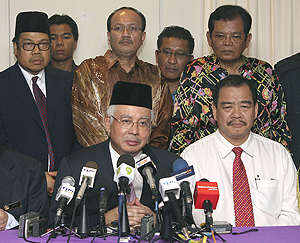The Malaysian national and state elections on 8 March 2008 surprised all observers.
Prime Minister Abdullah Badawi’s ruling coalition, Barisan Nasional, lost its two-thirds majority in the federal parliament, and a coalition of secular and Islamist opposition parties, Pakatan Rakyat, won five state governments.
The election saw Malaysia’s ethnic voting patterns break down to an unprecedented extent.
Pakatan leader Anwar Ibrahim heralded the result as a ‘New Dawn’ for Malaysian politics. Pakatan’s rise seemed to finally enable the creation of a new politics that could somehow unite both Islamists and liberal cosmopolitans against ethnic and religious political manipulation.

Very quickly however, the possibility of a genuine political challenge to Barisan began to fade.
Instead of articulating a post-racial vision, Anwar’s major post-election strategy has consisted of seeking defectors from the ruling coalition. He even suggested 16 September as the date Pakatan would gain the numbers to form a new federal government.
Instead, almost one year on, Pakatan’s state government in Perak has collapsed. Pakatan representatives crossed over as Barisan allies instead, reportedly in return for millions of ringgit in payment. Media speculation over the viability of the Selangor and Kedah Pakatan governments is intense.
Malaysia’s New Dawn has been reduced to a sheer numbers game. The grim calculus of attaining numerical dominance in state and federal legislatures, in turn, has seen important players launch cynical and calculated attacks based on sex, race and religion against Pakatan parliamentarians.
Two recent events have revealed that sex, race and religion are still key themes, and major political weapons, in Malaysian public life.
A Pakatan member of the Selangor state assembly, Elizabeth Wong, offered her resignation on 18 February 2009, after photographs of her sleeping semi-naked were leaked to the Malay Mail, a government-linked tabloid.
The photographs appear to have been taken without Wong’s consent by a former partner and political ally.
Despite the cruelty of the public betrayal, and Wong having broken no laws, the photographs were immediately used to slur her character. Former Barisan Chief Minister for Selangor, Mohamad Khir Toyo, quickly declared that “This is about morality”. It was not necessary to elaborate, but Khir persisted, “She is a single person. How can she allow a man into her room when they are not married?” Wong’s resignation has not yet been accepted by the Pakatan leadership, but she has effectively been shamed off the political stage. She has been one of Pakatan’s brightest stars, one of the most capable of articulating the new politics that was promised last year.
Months earlier, in September 2008, another high-profile, ethnic Chinese Pakatan member for Selangor, Teresa Kok, found her parents’ home had been firebombed.
Some weeks earlier, the same Khir Toyo had used his blog to allege that Kok had asked that a mosque in her constituency cease amplifying the azan (Muslim call to prayers). The accusation was repeated in another newspaper, Utusan Malaysia.Mosque officials quickly revealed that the amplifier was actually faulty, but Kok was arrested and detained under the Internal Security Act, which allows for indefinite detention. Several Muslim NGOs, widely regarded as government fronts, quickly declared Kok an enemy of Islam.
Fortunately for Kok, other prominent Muslim organisations denounced her detention and she was released a week later. Regardless, the insinuations continued, and Kok was accused of wearing a short skirt to a Ramadan meal to break the fast.
Attached to the Molotov cocktails was a note which mocked her racially, called her a pig, and threatened that she would burn next.
These two women’s public humiliation has been driven by two developments following the election.
First, Kok was detained on 12 September, days before Anwar’s federal government crossover deadline. The political defectors, however, did not exist.
Second, Barisan’s reduced majority has created much bitterness within its main constituent party, the United Malays National Organisation (UMNO). Abdullah was immediately blamed for the poor election result. A political succession deal was brokered and Deputy Prime Minister, Najib Tun Razak, will apparently become Prime Minister next month.
Khir, too, is involved in a major power struggle. Vying for the position of UMNO Youth Chief, Khir is hoping to undermine the Pakatan state governments with appeals to racial and religious majoritarianism, and widespread community acceptance of the moral surveillance of Malay-Muslim women.
The moral insinuations which result, along with frequent racial and religious slurs, are key features of Malaysian political life. Non-Malay, unsurveilled, non-Muslim and immoral: two prominent, unmarried and politically capable Chinese women hit all the important political triggers at once.
Pakatan component parties have condemned the attack on Wong’s character. However, Islamists in the coalition—like Barisan—have an active interest in promoting public discussion of women’s personal choices.
Other power-brokers are focused on keeping the coalition together, and on winning two upcoming by-elections in Perak and Kedah states. Without a coherent, unifying vision to bind the coalition, Pakatan has lacked the political resources to defend Wong, and her fate is uncertain.
Author: Amrita Malhi, ANU
